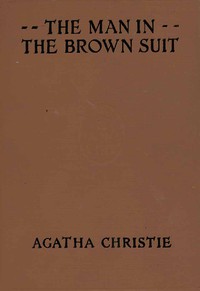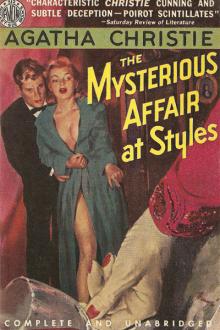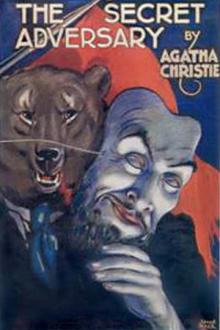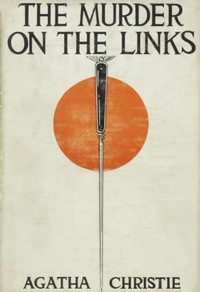The Man in the Brown Suit by Agatha Christie (ebook reader browser .TXT) 📗

- Author: Agatha Christie
Book online «The Man in the Brown Suit by Agatha Christie (ebook reader browser .TXT) 📗». Author Agatha Christie
I concurred heartily with John’s by no means original remarks.
“The young man now,” said Mrs. James, reverting suddenly to a former point in the conversation. “He was upset. His eyes, light eyes, they were, I noticed them particular, was all shining. Excited, I thought. But I never dreamt of anything being wrong. Not even when he came out again looking all queer.”
“How long was he in the house?”
“Oh, not long, a matter of five minutes maybe.”
“How tall was he, do you think? About six foot?”
“I should say so maybe.”
“He was clean-shaven, you say?”
“Yes, miss—not even one of these toothbrush moustaches.”
“Was his chin at all shiny?” I asked on a sudden impulse.
Mrs. James stared at me with awe.
“Well, now you come to mention it, miss, it was. However did you know?”
“It’s a curious thing, but murderers often have shiny chins,” I explained wildly.
Mrs. James accepted the statement in all good faith.
“Really, now, miss. I never heard that before.”
“You didn’t notice what kind of a head he had, I suppose?”
“Just the ordinary kind, miss. I’ll fetch you the keys, shall I?”
I accepted them, and went on my way to the Mill House. My reconstructions so far I considered good. All along I had realized that the differences between the man Mrs. James had described and my Tube “doctor” were those of non-essentials. An overcoat, a beard, gold-rimmed eyeglasses. The “doctor” had appeared middle-aged, but I remembered that he had stooped over the body like a comparatively young man. There had been a suppleness which told of young joints.
The victim of the accident (the Moth Ball man, as I called him to myself) and the foreign woman, Mrs. de Castina, or whatever her real name was, had had an assignation to meet at the Mill House. That was how I pieced the thing together. Either because they feared they were being watched or for some other reason, they chose the rather ingenious method of both getting an order to view the same house. Thus their meeting there might have the appearance of pure chance.
That the Moth Ball man had suddenly caught sight of the “doctor,” and that the meeting was totally unexpected and alarming to him, was another fact of which I was fairly sure. What had happened next? The “doctor” had removed his disguise and followed the woman to Marlow. But it was possible that had he removed it rather hastily traces of spirit-gum might still linger on his chin. Hence my question to Mrs. James.
Whilst occupied with my thoughts I had arrived at the low old-fashioned door of the Mill House. Unlocking it with the key, I passed inside. The hall was low and dark, the place smelt forlorn and mildewy. In spite of myself, I shivered. Did the woman who had come here “smiling to herself” a few days ago feel no chill of premonition as she entered this house? I wondered. Did the smile fade from her lips, and did a nameless dread close round her heart? Or had she gone upstairs, smiling still, unconscious of the doom that was so soon to overtake her? My heart beat a little faster. Was the house really empty? Was doom waiting for me in it also? For the first time, I understood the meaning of the much-used word, “atmosphere.” There was an atmosphere in this house, an atmosphere of cruelty, of menace, of evil.
Shaking off the feelings that oppressed me, I went quickly upstairs. I had no difficulty in finding the room of the tragedy. On the day the body was discovered it had rained heavily, and large muddy boots had trampled the uncarpeted floor in every direction. I wondered if the murderer had left any footmarks the previous day. It was likely that the police would be reticent on the subject if he had, but on consideration I decided it was unlikely. The weather had been fine and dry.
There was nothing of interest about the room. It was almost square with two big bay windows, plain white walls and a bare floor, the boards being stained round the edges where the carpet had ceased. I searched it carefully, but there was not so much as a pin lying about. The gifted young detective did not seem likely to discover a neglected clue.
I had brought with me a pencil and notebook. There did not seem much to note, but I duly dotted down a brief sketch of the room to cover my disappointment at the failure of my quest. As I was in the act of returning the pencil to my bag, it slipped from my fingers and rolled along the floor.
The Mill House was really old, and the floors were very uneven. The pencil rolled steadily, with increasing momentum, until it came to rest under one of the windows. In the recess of each window there was a broad window-seat, underneath which there was a cupboard. My pencil was lying right against the cupboard door. The cupboard was shut, but it suddenly occurred to me that if it had been open my pencil would have rolled inside. I opened the door, and my pencil immediately rolled in and sheltered modestly in the farthest corner. I retrieved it, noting as I did so that owing to the lack of light and the peculiar formation of the cupboard one could not see it, but had to feel for it. Apart from my pencil the cupboard was empty, but being thorough by nature I tried the one under the opposite window.
At first sight, it looked as though that also was empty, but I grubbed about perseveringly, and was rewarded by feeling my hand close on a hard paper cylinder which lay in a sort of trough, or depression, in the far corner of the cupboard. As soon as I had it in my hand, I knew what it was. A roll of Kodak films. Here was a find!
I realized, of course, that these films might very well be an old roll belonging to Sir Eustace Pedler which had rolled in here and had not been found when the cupboard was emptied. But I did not think so. The red paper was far too fresh-looking. It was just as dusty as it would have been had it laid there for two or three days—that is to say, since the murder. Had it been there for any length of time, it would have been thickly coated.
Who had dropped it? The woman or the man? I remembered that the contents of her handbag had appeared to be intact. If it had been jerked open in the struggle and the roll of films had fallen out, surely some of the loose money would have been scattered about also? No, it was not the woman who had dropped the films.
I sniffed suddenly and suspiciously. Was the smell of moth balls becoming an obsession with me? I could swear that the roll of films smelt of it also? I held them under my nose. They had, as usual, a strong smell of their own, but apart from that I could clearly detect the odour I disliked so much. I soon found the cause. A minute shred of cloth had caught on a rough edge of the centre wood, and that shred was strongly impregnated with moth balls. At some time or another the films had been carried in the overcoat pocket of the man who was killed in the Tube. Was it he who had dropped them here? Hardly. His movements were all accounted for.
No, it was the other man, the “doctor.” He had taken the films when he had taken the paper. It was he who had dropped them here during his struggle with the woman.
I had got my clue! I would have the roll developed, and then I would have further developments to work upon.
Very elated, I left the house, returned the keys to Mrs. James and made my way as quickly as possible to the station. On the way back to town, I took out my paper and studied it afresh. Suddenly the figures took on a new significance. Suppose they were a date? 17 1 22. The 17th of January, 1922. Surely that must be it! Idiot that I was not to have thought of it before. But in that case I must find out the whereabouts of Kilmorden Castle, for to-day was actually the 14th. Three days. Little enough—almost hopeless when one had no idea of where to look!
It was too late to hand in my roll to-day. I had to hurry home to Kensington so as not to be late for dinner. It occurred to me that there was an easy way of verifying whether some of my conclusions were correct. I asked Mr. Flemming whether there had been a camera amongst the dead man’s belongings. I knew that he had taken an interest in the case and was conversant with all the details.
To my surprise and annoyance he replied that there had been no camera. All Carton’s effects had been gone over very carefully in the hopes of finding something that might throw light upon his state of mind. He was positive that there had been no photographic apparatus of any kind.
That was rather a set-back to my theory. If he had no camera, why should he be carrying a roll of films?
I set out early next morning to take my precious roll to be developed. I was so fussy that I went all the way to Regent Street to the big Kodak place. I handed it in and asked for a print of each film. The man finished stacking together a heap of films packed in yellow tin cylinders for the tropics, and picked up my roll.
He looked at me.
“You’ve made a mistake, I think,” he said, smiling.
“Oh, no,” I said. “I’m sure I haven’t.”
“You’ve given me the wrong roll. This is an unexposed one.”
I walked out with what dignity I could muster. I dare say it is good for one now and again to realize what an idiot one can be! But nobody relishes the process.
And then, just as I was passing one of the big shipping offices, I came to a sudden halt. In the window was a beautiful model of one of the company’s boats, and it was labelled “Kenilworth Castle.” A wild idea shot through my brain. I pushed the door open and went in. I went up to the counter and in faltering voice (genuine this time!) I murmured:
“Kilmorden Castle?”
“On the 17th from Southampton. Cape Town? First or second class?”
“How much is it?”
“First class, eighty-seven pounds——”
I interrupted him. The coincidence was too much for me. Exactly the amount of my legacy! I would put all my eggs in one basket.
“First class,” I said.
I was now definitely committed to the adventure.
It is an extraordinary thing that I never seem to get any peace. I am a man who likes a quiet life. I like my Club, my rubber of Bridge, a well-cooked meal, a sound wine. I like England in the summer, and the Riviera in the winter. I have no desire to participate in sensational happenings. Sometimes, in front of a good fire, I do not object to reading about them in the newspaper. But that is as far as I am willing to go. My object in life is to be thoroughly comfortable. I have devoted a certain amount of thought, and a considerable amount of money, to further that end. But I cannot say that I always succeed. If things do not actually happen to me, they happen round me, and frequently, in spite of myself, I become involved. I hate being involved.
All this because Guy Pagett came into my bedroom this morning with a telegram in his hand and a face as long as a mute at a funeral.
Guy Pagett is my secretary, a zealous, painstaking, hard-working fellow, admirable in every respect. I know no one who annoys me more. For a long time I have been racking my brains as to how to get rid of him. But you cannot very well dismiss a secretary because he prefers work to play, likes getting up early in the morning, and has positively no vices. The only amusing thing about the fellow is his face. He has the face of a fourteenth-century poisoner—the sort of man the Borgias got to do their odd jobs for them.
I wouldn’t mind so much if Pagett didn’t make me work too. My idea of work is something that should be undertaken lightly and airily—trifled with, in fact! I doubt if Guy Pagett has ever trifled with anything in his life. He takes everything seriously. That is what makes him so difficult to live with.
Last week I had the brilliant





Comments (0)